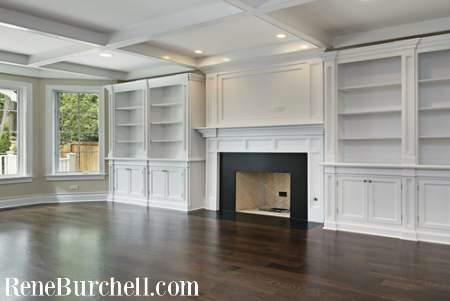Shiny and new doesn’t mean perfect and problem free, especially when it comes to real estate. You may have decided not to purchase anyone else’s history, and that’s great! There’s something more than a little intriguing about being the first people ever to live in a brand new house, especially the way new construction is designed to suit modern high-tech lifestyles. There’s that new carpet smell, that fresh paint look, the sounds of settling wood. And it’s even better when you can select some of the finishes such as flooring, countertops, and other fixtures and fittings. But it’s not all a walk on sunshine, things do go wrong, there are things to consider, and you may find you’re not as prepared as you think you are – especially regarding money matters. Here’s what you need to know about when you buy new construction.
Money, Money, Money!
 You’ll need a twenty percent down payment for the home you plan to purchase. Many buyers aren’t aware going into the experience that they’re also responsible for closing costs, an estimated 1-8 percent of the home’s value on top of what you’ve already paid. And just like a fast-food restaurant wants to upsell you, a new construction real estate builder also has sales tactics and teams in place to help you amp up your new home from, “oh, that’s nice,” to “I can’t believe this is my house!” Just know that for every extra touch you add to your home’s charm, the higher your monthly mortgage payments will be, and you’ll be paying exorbitant prices for upgraded appliances plus interest. So when you go into the house-hunt game, know that your wallet is going to be seriously stretched, and stressfully so if you didn’t see it coming.
You’ll need a twenty percent down payment for the home you plan to purchase. Many buyers aren’t aware going into the experience that they’re also responsible for closing costs, an estimated 1-8 percent of the home’s value on top of what you’ve already paid. And just like a fast-food restaurant wants to upsell you, a new construction real estate builder also has sales tactics and teams in place to help you amp up your new home from, “oh, that’s nice,” to “I can’t believe this is my house!” Just know that for every extra touch you add to your home’s charm, the higher your monthly mortgage payments will be, and you’ll be paying exorbitant prices for upgraded appliances plus interest. So when you go into the house-hunt game, know that your wallet is going to be seriously stretched, and stressfully so if you didn’t see it coming.
Don’t over-extend. Remember your property taxes, homeowner’s insurance, the basic needs of home ownership such as trash cans and dish soap. You’ll have a new set of utility bills as well with balances you can’t yet project, so be rock solid financially before attempting to buy new construction.
You Still Need a Buyer’s Agent
Just because the home you’re buying from the builder is brand-spanking-new in a fledgling community does not mean you don’t still need representation of your own. You do. Ask your buyer’s agent to accompany you on tours of model homes, help you understand what programs and features may be available to you, work through contract details, and see you through to the destination of a happy homeowner.
Some new construction communities have restrictions on what buyer’s real estate agents can or cannot do, so check into the policies of the builder and the agent before moving forward. It’s usually the seller’s agent who compensates the buyer’s agent, and since the seller is the builder, that may alter things a bit. Ask for clarity.
Do not walk into the sales office of a new community and allow that agent to work his or her magic. That agent works as a selling agent for the builder and has the builder’s best interests in mind, not yours. A seller’s agent working for the builder and a buyer’s agent working for the buyer do not have the same job description. Let a buyer’s agent walk you through the process, protect your interests, and help save you trouble, time, and money along your journey of owning a brand new home.
Bargain with Bonuses, not with Bucks
Chances are, if you’re shopping new construction homes, although you may not be carelessly chucking money out the window, you’re not necessarily scouting out a bargain. But as you begin to add on the extras available in new construction, you can feel the pinch and acknowledge a need to cut back costs somewhere. In most real estate transactions with pre-owned homes, there’s lots of wiggle room for the wheel and deal. But that’s not the case in brand new communities that are still under construction.
Many before you have tried and failed. Don’t try to negotiate a lower price for a home with a builder. Builders will work with you to a degree, but not when it comes to home value. Homebuilders just don’t come off of those price tags. However, you can pack some power with upgrades and add-ons as high-end floors or state-of-the-art appliances – bonuses worth negotiating.
How to Choose the Right House
 Many factors contribute to a buyer’s decision to purchase a particular house, especially when that property is new construction. House hunters shop specifically by builder (like shopping for brand-specific shoes). Other potential homeowners are more concerned with the neighborhood, so they’re not as fussy about builder as they are about where the new construction home will live. Sometimes, timelines are a factor, such as when new construction homes will be move-in ready within a particular community.
Many factors contribute to a buyer’s decision to purchase a particular house, especially when that property is new construction. House hunters shop specifically by builder (like shopping for brand-specific shoes). Other potential homeowners are more concerned with the neighborhood, so they’re not as fussy about builder as they are about where the new construction home will live. Sometimes, timelines are a factor, such as when new construction homes will be move-in ready within a particular community.
Talk with your agent about what you’re looking for in a new home such as the number of rooms, floor plan, layout, features, living space, yard size, commute time, community amenities, and all the other items on your wish list. Talk about price, so you know your wish list is doable, and then remember – when you shop new construction, all the houses are priced “starting at…” but most fall under the category of, “…and up.”
The homes you tour start at base price with essential features. You may not know when browsing homes what features are standard and which are upgrades. This lack of understanding is another area where your real estate agent will be beneficial to you. But if you’re ever unsure about what the builder is offering, then ask. It’s better to be clear in understanding now than to face unexpected obstacles mid-transaction.
Research the builder. Check the Better Business Bureau for complaints. Check county clerk records to see if any liens have been filed.
Research the community. Research the building plans and zoning codes as well as HOAs.
Home Owners’ Associations
Many new neighborhoods are master-planned communities with shared amenities such as swimming pools, fitness centers, and parks. Those associations provide a list of bylaws and regulations designed to protect the integrity of the community as well as home values. But the HOA fees can be steep, the rules can be strict, and the governing may seem stifling. If the home you’re buying is in a community with an HOA, make sure it’s an HOA you can live with and afford. See if you can access a copy, even if temporarily, of their bylaws, meeting notes, and other information that can make you aware of how that association might influence your lifestyle.
Understanding Upgrades
You can order your state-of-the-art gas range from the builder, or you can order it from any other store and probably pay less. It’s true there’s both an edge and excitement to being able to pick out all the trimmings at one place without having to go from store to store or vendor to vendor looking for just the right sink faucets. It’s also easy since you’re financing the purchase, to over-spend because you can just “throw that on the mortgage payment” without really calculating the cost of your monthly bill. And, in some cases, it’s well worth the “convenience fee” of designing the home with the builder to save the time and energy of doing all that legwork. You just want to move in and be done with it. Just know that the builder’s markup on appliances and upgrades is ridiculous, so you may want to do some window-shopping at appliance stores before you meet with your design team just to get an idea of what’s standard.
Know what’s standard vs. what’s extra. Get a feature sheet to educate yourself about what comes with the home’s base price, and then compare feature by feature. You also don’t have to do all of the upgrades, either. If you’re an excellent chef and want a full-service kitchen, then you may want to update the stove or refrigerator. However, if you’re not killing it in the kitchen and plan for only typical use, the standard range should function just fine.
What Your Neighborhood Will be Lacking
 While it’s exciting to imagine a brand new house with sparkling everything, it can be frustrating to wait for newly-planted landscaping to grow into itself. There are no tall trees to line the winding roads of neighborhoods. Yard lawns won’t be lush and full.
While it’s exciting to imagine a brand new house with sparkling everything, it can be frustrating to wait for newly-planted landscaping to grow into itself. There are no tall trees to line the winding roads of neighborhoods. Yard lawns won’t be lush and full.
Not only will the yards and trees be immature, but so will the community spirit. You’ll be moving in at the same time as most of your neighbors, so the neighborhood vibe has yet to be established. The good news is, you’ll get to be a part of that.
Ask About Warranties and Guarantees
Many new homes do come with a home warranty to protect the homeowner against faults during the first couple of years. And many of the appliances may also have guarantees. You may have to pay a little more for it, but it’d be worth it. Get all of these details in writing, so you know what to expect.
Have the House Inspected
Just because it’s new doesn’t mean your new house is perfect and free from human error or shortcomings in materials. Call in an inspector who works for you to ensure the house is in excellent condition upon move in. The builder should be willing to make any repairs before you move in.
Think About the Resale Value
If your builder is in the beginning phases of erecting your community, they may still be building houses when you’re ready to sell yours and move on. You may find yourself sitting in a house you’ve outgrown because the builder is still selling the same model brand new for around the same price you’d have to list yours for, or bound by contract not to sell before a specified date.
What About the Construction Zone?
Also, with newly constructed communities, the niche neighborhoods are built one at a time. What this means is that there may be a steady and unrelenting stream of construction around your property. You may find yourself frustrated with the noise, the dust, the traffic, or all of the inconveniences of construction.
The entire community may be new, meaning that also under construction are grocery stores, gas stations, businesses, parking lots, and no end in sight to the dust, debris, and congestion of construction.
Furthermore, with those areas still in development, check what sources are available to you at the present moment. Are the lots receptive to cell phone signals? How far is the closest fully stocked grocery store?
Conclusion
Attraction to the shiny and new is typical. You’re over-the-top excited about being the first people to occupy that house in that neighborhood. You should be! But to enjoy the experience with a more educated point of view, keep your head in the game and your eye on the prize.
Before you buy, research the builders for an understanding of the quality of craftsmanship and building materials, and to review their ratings and customer testimonials. Investigate the neighborhood to find out what resources are already available, what utilities are not yet in place, what construction is still underway, and what commercial businesses are still being added that could impact your way of life (or block your views!). Know what you can afford for the bare-bones basics, and how much wiggle room you have to add in some fancy. Have a sound understanding of community amenities and HOA fees and regulations. Figure into the finances the extra costs of property taxes, homeowner’s insurance, HOA fees, upgrades, and add-ons to the home, and know that you’ll undoubtedly be spending more than you’d initially planned.
Don’t expect perfection. Don’t get sucked into the add-ons and upgrades that could take you from financially comfortable to completely house-poor in a matter of a one-hour design consultation. You can always change things up in the future with small renovation projects like updating the kitchen flooring or upgrading appliances one unit at a time. Understand that your new community will also take some time to grow into itself regarding landscaping and the neighborhood vibe.
Call Rene Burchell today at 469-877-3303 to tour available houses for sale in Frisco and surrounding areas.


